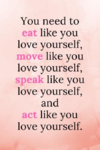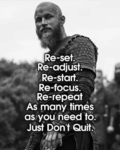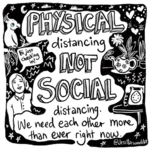Cate
Long term member
Set goals
Weight-loss goals can mean the difference between success and failure. Realistic, well-planned weight-loss goals keep you focused and motivated. They provide a plan for change as you transition to a healthier lifestyle.
But not all weight-loss goals are helpful. Unrealistic and overly aggressive weight-loss goals can undermine your efforts. Use the following tips for creating goals that will help you reduce weight and improve your overall health.
Focus on process goals
Goals for weight loss can focus on outcomes or the process. An outcome goal — what you hope to achieve in the end — might be to lose a certain amount of weight. While this goal may give you a target, it doesn't address how you will reach it.
A process goal is a necessary step to achieving a desired outcome. For example, a process goal might be to eat five servings of fruits or vegetables a day, to walk 30 minutes a day, or to drink water at every meal. Process goals may be particularly helpful for weight loss because you focus on changing behaviours and habits that are necessary for losing weight.
Set SMART goals
A good goal-setting strategy is the SMART goal checklist. Be sure that your weight-loss goals — whether a process goal or an outcome goal — meet the following criteria:
Long-term and short-term goals
Long-term goals help you focus on the big picture. They can shift your thinking from simply being on a diet to making lifestyle changes. But long-term goals may seem too difficult or too far away. You may benefit from breaking down a long-term goal into a series of smaller, short-term goals.
If your outcome goal is to lose 15 pounds (7 kilograms) in three months, you may break it down into separate goals for each month, perhaps 7 pounds (3 kilograms) for the first month and 4 pounds (2 kilograms) for each of the last two months because early weight loss is often faster. An example of a process goal might be to walk 30 minutes a day. If you currently don't walk regularly at all, you may want to walk 15 minutes a day for two weeks and then add five minutes to your walk each week.
Allow for setbacks
Setbacks are a natural part of behaviour change. Everyone who successfully makes changes in his or her life has experienced setbacks. It's better to expect them and develop a plan for dealing with them. Identifying potential roadblocks — a big holiday meal or an office party, for example — and brainstorming specific strategies to overcome them can help you stay on course or get back on course.
Reassess and adjust your goals as needed
Be willing to change your goals as you make progress in your weight-loss plan. If you started small and achieved success, you might be ready to take on larger challenges. Or you might find that you need to adjust your goals to better fit your new lifestyle.
Weight-loss goals can mean the difference between success and failure. Realistic, well-planned weight-loss goals keep you focused and motivated. They provide a plan for change as you transition to a healthier lifestyle.
But not all weight-loss goals are helpful. Unrealistic and overly aggressive weight-loss goals can undermine your efforts. Use the following tips for creating goals that will help you reduce weight and improve your overall health.
Focus on process goals
Goals for weight loss can focus on outcomes or the process. An outcome goal — what you hope to achieve in the end — might be to lose a certain amount of weight. While this goal may give you a target, it doesn't address how you will reach it.
A process goal is a necessary step to achieving a desired outcome. For example, a process goal might be to eat five servings of fruits or vegetables a day, to walk 30 minutes a day, or to drink water at every meal. Process goals may be particularly helpful for weight loss because you focus on changing behaviours and habits that are necessary for losing weight.
Set SMART goals
A good goal-setting strategy is the SMART goal checklist. Be sure that your weight-loss goals — whether a process goal or an outcome goal — meet the following criteria:
- Specific. A good goal includes specific details. For example, a goal to exercise more is not specific, but a goal to walk 30 minutes after work every day is specific. You're declaring what you will do, how long you will do it and when you will do it.
- Measurable. If you can measure a goal, then you can objectively determine how successful you are at meeting the goal. A goal of eating better is not easily measured, but the goal of eating 1,200 calories a day can be measured. A goal of riding your bike is not measurable. A goal of riding your bike for 30 minutes three days a week is measurable.
- Attainable. An attainable goal is one that you have enough time and resources to achieve. For example, if your work schedule doesn't allow spending an hour at the gym every day, then it wouldn't be an attainable goal. However, two weekday trips to the gym and two weekend trips might be attainable. If a particular type of exercise, such as running, is physically too difficult for you, then running every day would not be an attainable goal.
- Relevant. It's important to set goals that are relevant and meaningful to you and where you're at in your life right now. Don't set goals that someone else wants you to obtain. Ask yourself what's most important to you, and then determine your goals. Is weight loss a priority for you? If so, ask your doctor to help you determine a daily calorie goal based on your current weight and health.
- Time-limited. Pick your goal and set a deadline accordingly. For example, if you want to lose 10 pounds (4.5 kilograms), circle a finish line on a calendar and strive for that. Giving yourself a time limit can motivate you to get started and stay on course.
Long-term and short-term goals
Long-term goals help you focus on the big picture. They can shift your thinking from simply being on a diet to making lifestyle changes. But long-term goals may seem too difficult or too far away. You may benefit from breaking down a long-term goal into a series of smaller, short-term goals.
If your outcome goal is to lose 15 pounds (7 kilograms) in three months, you may break it down into separate goals for each month, perhaps 7 pounds (3 kilograms) for the first month and 4 pounds (2 kilograms) for each of the last two months because early weight loss is often faster. An example of a process goal might be to walk 30 minutes a day. If you currently don't walk regularly at all, you may want to walk 15 minutes a day for two weeks and then add five minutes to your walk each week.
Allow for setbacks
Setbacks are a natural part of behaviour change. Everyone who successfully makes changes in his or her life has experienced setbacks. It's better to expect them and develop a plan for dealing with them. Identifying potential roadblocks — a big holiday meal or an office party, for example — and brainstorming specific strategies to overcome them can help you stay on course or get back on course.
Reassess and adjust your goals as needed
Be willing to change your goals as you make progress in your weight-loss plan. If you started small and achieved success, you might be ready to take on larger challenges. Or you might find that you need to adjust your goals to better fit your new lifestyle.









